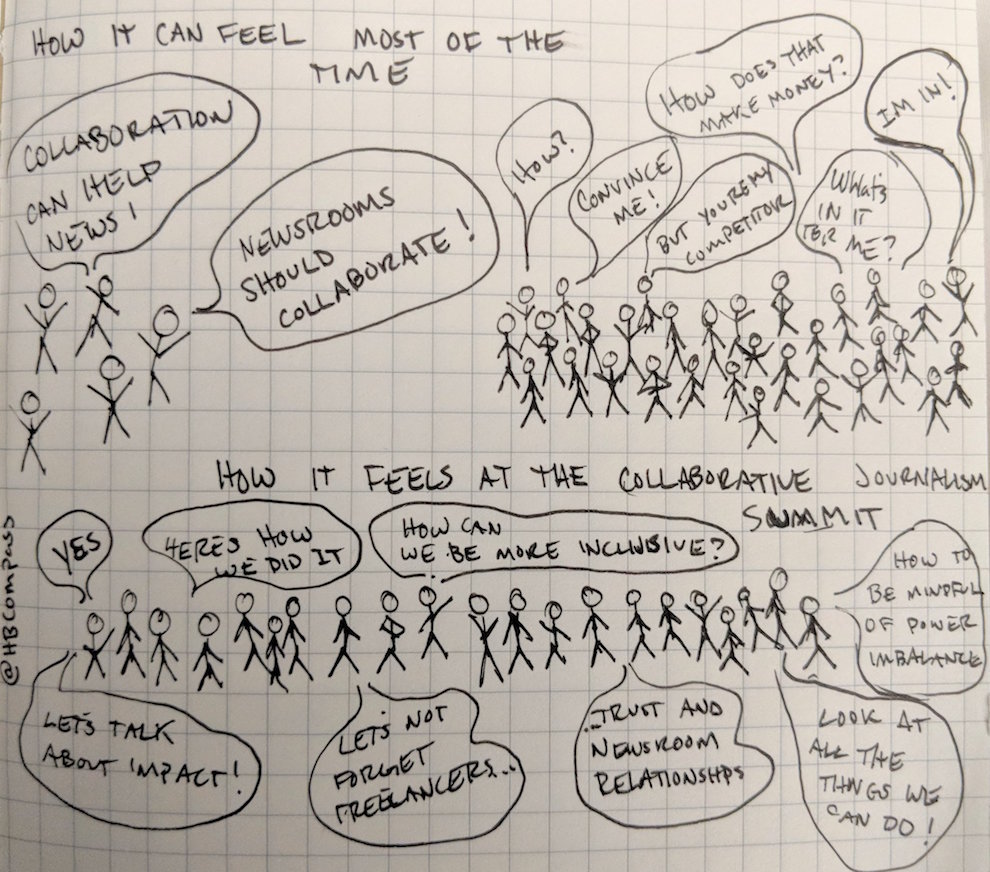
Two powerhouse gatherings in the journalism world happened at the end of last week, digging into topics from collaborative journalism to reader revenue.
The ONA Insights event in Toronto featured keynotes on Vox Media’s editorial voice and blockchain in journalism with dives into newsletters, analytics, growth in international audience, and more. Over in New Jersey, the Center for Cooperative Media’s collaborators met to brainstorm about working together in journalism at the Collaborative Journalism Summit.
What were the top #learnings from these events? We’ve rounded them up for you here!
The Solutions Journalism Network’s collaborative playbook launched over the weekend as well, and you can find it here. Heather Bryant‘s collaborative journalism workbook is available here.
Attitudes about newsroom collaboration are improving but it can feel like an uphill push sometimes which is why the Collaborative Journalism Summit is so important. There’s nothing quite like getting 150+ people in a room who agree on its value and want to make it better. pic.twitter.com/tu7fvw8QdE
— Heather Bryant (@HBCompass) May 10, 2018
Q from @StefanieMurray: How should we build equitable partnerships? Answer from the panel is clear (and imo absolutely foundational to collaboration): proper attribution and credit. #collabj
— Tom Trewinnard (@Tom_El_Rumi) May 10, 2018
The donts of Collaborative Journalism. Liza Gross @soljourno @CenterCoopMedia @knightfdn #collabj pic.twitter.com/GKAB0yzOJC
— Karen Rundlet (@kbmiami) May 11, 2018
I’m obsessed with the last question on this slide. As we do journalism we have to (regardless of the kind of newsroom we’re in) consider whether we are doing journalism for and with a community or about a community. #collabj pic.twitter.com/oU4G9ynmL2
— Heather Bryant (@HBCompass) May 10, 2018
I’m so glad to see this slide. Concern about story and scoop stealing is one I hear frequently from newsrooms that aren’t yet collaborating. That isn’t and shouldn’t be the the roadblock. We need to work together. #collabj pic.twitter.com/81QW56BJfU
— Heather Bryant (@HBCompass) May 11, 2018
The collaborating partners of @crosscheck didn’t make any mistakes in their coverage of the French elections. Together, they created high quality journalism. #collabj pic.twitter.com/HKobD1mTcT
— Heather Bryant (@HBCompass) May 11, 2018
You can also see some of the sessions recorded and with notes here.
Thread of helpful questions to consider:
Here are a few practical concepts around #subscriber #retention after our talk at #ONAInsights today:
1) What is your welcome series after someone subscribes? Does it actually help people use your product better? Does it help answer repeat questions?
— David Grant (@DW_Grant) May 11, 2018
I love this: @decorrespondent recently hired a Conversations Editor. Their primary job is to bring underrepresented groups into the discussions & coverage on their site. For example, new refugees. #ONAInsights pic.twitter.com/ClFu2J2aRk
— Shannon Busta (@Busta_) May 11, 2018
.@celrae at #ONAinsights: “When a sponsor asks to influence an event, it’s an opportunity to explain why editorial independence increases the value of your brand. It’s sometimes nice to be asked in order to say no.”
I’d make a similar point about engagement work + blurry lines
— Ariana Tobin (@Ariana_Tobin) May 11, 2018
It’s unanimous: panelists say email is the best way to increase membership. Also popular are on-site asks. #ONAInsights
— Delaney Ross (@delaneychambers) May 11, 2018
“We look at how local journalism can win globally and how global journalism can win locally.” – says @millie #ONAInsights
— Niketa Patel (@Niketa) May 11, 2018
Comment from audience mentions the potential creepiness of telling people what they read, personalization.@tjortenzi acknowledges issues.@ShowReviews4U “We’re totally not creepy.” Needs to be able to identify subscriber sunset.@meghas We sub-creep.#ONAInsights
— Saleem Khan (@sklive) May 11, 2018
On expanding your news site internationally: it’s not knowing the language that’s most important, it’s knowing what moves people there. 👏 #ONAinsights HT @christianoliver
— Delaney Ross (@delaneychambers) May 11, 2018
.@ArielBurkett talks about @globeandmail events:
Ultimate goal = reduce churn, & it works.
No charge, only for subscribers + each can bring guest (!!!).
Younger audience than avg. subscribers.
For every $1 spent to keep someone, it’d cost $10 to get someone new.#ONAinsights pic.twitter.com/CF6Q5bK4Wf
— Jonathan Zacks (@jozacks) May 11, 2018